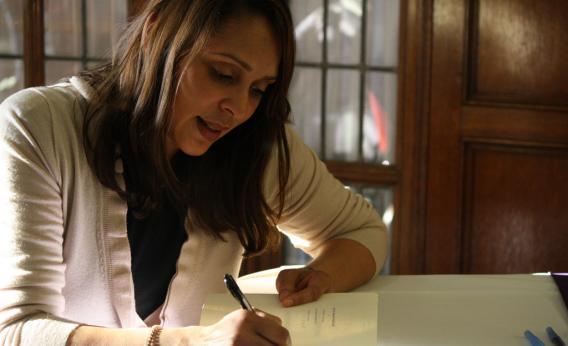Natasha Trethewey, an English and creative writing professor at Georgia’s Emory University and the winner of the 2007 Pulitzer Prize for her book Native Guard, was named the 19th U.S. poet laureate this morning. At 46, she is one of the youngest writers to hold the post, as well as the first Southerner since Robert Penn Warren (1986) and the first African American since Rita Dove (1993).
While the grand title of “laureate” harkens back to ancient Greece, where poets were honored with laurels (since laurel trees were sacred to Apollo, the god of verse), the American position began with the more New World title of “consultant.” Since 1937, the Library of Congress has appointed a Consultant in Poetry, and, since 1986, that person has been known as the Poet Laureate Consultant in Poetry. The modern-day laureate, who presides from September to May, earns a $35,000 stipend and is responsible for sustaining and promoting poetry’s place in American culture.
“Ms. Trethewey’s great theme is memory,” says the New York Times—especially the eddying of personal and cultural memory around decisive events like the Civil War. Native Guard, for instance, pieces together the untold stories of black soldiers tasked with guarding a Confederate regiment off the coast of Mississippi. Framing the central sequence are more personal touches: meditations on Trethewey’s unorthodox family—her black mother wed her white father in defiance of Southern anti-miscegenation laws—and her own childhood.
When Trethewey was a freshman in college, her mother was murdered by her step-father. The young woman turned to poetry because, as she later explained to the Associated Press, “it seems like the only thing that can speak to the unspeakable.” During the late ’80s, she joined a group of black poets called the Dark Room Collective, where she thrived under the tutelage of Thomas Sayers Ellis and Sharan Strange. Domestic Work, her first collection, established Trethewey as a chronicler of secret or discarded histories. It recreates the experience of household servants, factory hands, and washerwomen—and captured the attention of Rita Dove, who awarded it the prestigious Cave Canem prize in 2000.
Trethewey also honors her mother with a string of elegies. Here are the closing lines from one of them (“Letter Home”):
So now, even as I write this
and think of you at home, Goodbye
is the waving map of your palm, is
a stone on my tongue.
In her second volume, Bellocq’s Ophelia (2002), Trethewey adopts the voice of a mixed-race prostitute from New Orleans’ red light district. Her latest book, Thrall, will be released in September 2012, the same month that she begins her appointment at the Library of Congress. These new poems are studies in racial estrangement as well as glittering art objects, like the 17th- and 18th-century oil paintings they describe. And they allow Trethewey to explore her fraught relationship with her father.
Poetry, Trethewey has said, “can connect us to people distant and different from us. It can remind us of how we are alike.”
